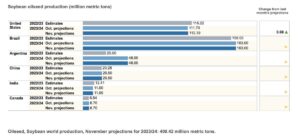U.S. agribusiness Cargill will permanently close its beef processing facility in Milwaukee, Wisconsin, and eliminate 221 jobs, according to a filing with the state, the latest U.S. beef plant to…
Dry Weather in Brazil Threatens Crops, Compels Tough Decisions for Farmers
Bloomberg writers Clarice Couto, Tarso Veloso, and Michael Hirtzer reported late last week that, “Parched fields and scorching heat have delayed soybean planting in the world’s biggest grower, imperiling the upcoming corn crop that can’t even begin until soy has been reaped.”
“The US Department of Agriculture this month estimated Brazil’s full-year [corn] crop at 129 million metric tons, down from 137 million tons last year — and that’s likely to fall further when the next report comes out in December,” the Bloomberg article said.

Couto, Veloso, and Hirtzer added that, “Researcher and brokerage Agrinvest Commodities says winter corn planting in the country looks set to fall at least 7% this upcoming season, while output is seen down as much as 14%. Soy estimates are also sinking, with Agrinvest slashing its forecast for the country’s output in the 2023-2024 planting year to 155.4 million tons, down from the 163 million tons it estimated just a few weeks prior.”

Reuters writers Ana Mano and Roberto Samora reported on Friday that,
Extremely dry weather is forcing farmers to give up on soy to plant cotton or another crop in Brazil’s top farm state Mato Grosso, cotton lobby groups and growers said.
“Mato Grosso cultivates two annual cotton crops, one during the soy season and another after soy is reaped from fields.
Brazilian farmer destroys hundreds of hectares of #Soybean due to poor condition after dry, hot weather. Decided to plant #cotton instead. Only one crop this year#agriculture #Weather #grains pic.twitter.com/BMh5AbtroP
— Marcelo Teixeira (@tx_marcelo) November 17, 2023
“But because soy farmers have reeled from lack of rains, they may switch crops and thus expand the area to be planted with first cotton in 2023, Decio Tocantins, director at state cotton growers group AMPA, said on Friday.”
Dry weather is also impacting transportation in the Amazon region.
Reuters writers Bruno Kelly and Jake Spring reported on Friday that, “A major tributary of the Amazon River fell to its lowest level in over a century on Monday at the heart of the Brazilian rainforest as a record drought upends the lives of hundreds of thousands of people and damages the jungle ecosystem.”
And Dow Jones writer Kirk Maltais reported on Friday that, “Corn for December delivery fell 1.4%, to $4.68 a bushel, on the Chicago Board of Trade on Friday, with traders bracing to see how much Brazilian weather may, or may not, show improvement over the weekend going into next week.”
The article pointed out that, “Tough weather in Brazil is expected to be a key factor weighing on grain futures for the rest of the year, with the northern portion of the country suffering with drought conditions and the southern part inundated with precipitation. If these conditions persist, then farmers there will have difficulty finishing planting, with ADM Investor Services projecting that roughly 25% of soybean acres may have to be replanted.”
Also Friday, Reuters writer Brendan O’Brien reported that, “The showers next week will briefly ease stress from heat and dryness in the northern 40% of Brazil’s soybean area, Commodity Weather Group said. Northern Brazil is then expected to dry out again, the firm said.”





